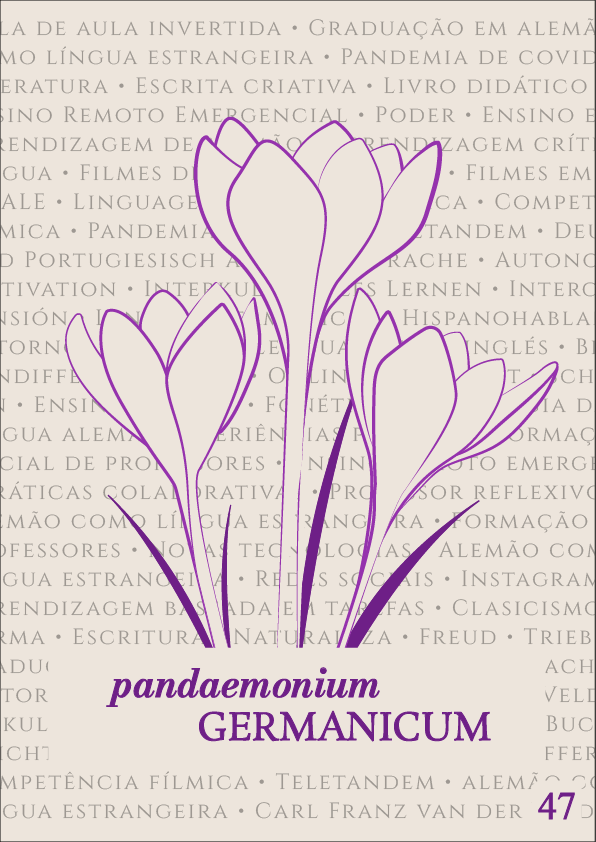Foreign language learning in Teletandem: A German-Brazilian collaboration project from the student’s perspective
DOI:
https://doi.org/10.11606/1982-883724547122Keywords:
Teletandem, German and Portuguese as a foreign language, Autonomy, Motivation, Intercultural learningAbstract
This article presents the results of an international Teletandem cooperation project between the Freie Universität Berlin and the University of São Paulo, with primary focus on the impact of the program from the perspective of the students who participated in the program. Teletandem partnerships are based on cooperations between universities around the world, offering students with different target languages the opportunity to deepen their language and cultural knowledge in a common context in video conferences (e.g. via Meet, Zoom, Skype). In this project, in which Brazilian and German students were involved, the students were accompanied by the project coordinators at three group meetings (introductory meeting, intermediate feedback and final feedback meeting) in addition to learning with their peers during the Tandem interactions. In order to establish hypotheses about the goals, expectations and experiences of Brazilian and German students, two data collections were carried out through online questionnaires. The results indicate a great potential of Teletandem projects, not only for better communication in the target language, but also for increasing motivation, autonomy and empathy as well as for critical reflection on the individual learning process.
Downloads
References
ARANHA, S.; CAVALARI S. M. A trajetória do projeto Teletandem Brasil: da modalidade institucional não-integrada à institucional integrada. The ESPecialist, v. 35, n. 2, 183-201, 2014.
AQUINO, M. Mudando o ritmo das aulas de alemão como língua adicional por meio de músicas e mídias digitais. Pandaemonium Germanicum, v. 24, n. 42, p. 22-47, 2021.
AUGUSTIN, W. Kooperativer Fremdsprachenerwerb im Teletandem: Grundlagen der Lehr- und Lernmethode. Mainz: ArchivMeD, 2011.
BECHTEL, M. Interkulturelles Lernen beim Sprachenlernen im Tandem: eine diskursanalytische Untersuchung. Tübingen: Narr, 2003.
BRAMMERTS, H. Autonomes Sprachenlernen im Tandem: Entwicklung eines Konzepts. In: Brammerts, H.; Kepplin, K.. (Hg.) Selbstgesteuertes Sprachenlernen im Tandem. Ein Handbuch. Tübingen: Stauffenburg, 2001, 9-16.
BRAMMERTS, H. Tandemberatung, Zeitschrift für Interkulturellen Fremdsprachenunterricht (ZIF), v. 11, n. 2, 1-16, 2006.
BRAMMERTS, H.; LITTLE, D. (Hg.) Leitfaden für das Sprachenlernen im Tandem über das Internet. Bochum: Brockmeyer, 1996.
BYRAM, M., Teaching and Assessing Intercultural Communicative Competence. Clevedon: Multilin, 1997.
COSTA, L. M. G. da; SALOMÃO, A. C. B.; ZAKIR, M. de A. Transcultural and Transcontinental Telecollaboration for Foreign Language Learning: proposals and challenges. Revista Do GEL, São Paulo, v. 15, n. 3, 26–41, 2018.
DOOLY, M. Telecollaborative Language Learning: A guidebook to moderating intercultural collaboration online. Bern: Peter Lang, 2008.
ELSTERMANN, A.-K. Lerner-Support im internationalen Kooperationsprojekt: Teletandem Brasilien - Fremdsprachen für alle. Informationen Deutsch als Fremdsprache, v. 41, n. 6, 650-667, 2014a.
ELSTERMANN, A.-K. Peergruppenberatung im Lernkontext Teletandem. In: BERNDT, A.; DEUTSCHMANN, R.-U. (Hg.) Sprachlernberatung – Sprachlerncoaching. Frankfurt a. M.: Lang, 2014b, 235-248.
HOLEC, H. Autonomy and Foreign Language Learning. Oxford: Pergamon Press, 1981.
HOLZKAMP, K. Die Fiktion administrativer Planbarkeit schulischer Lernprozesse. In: BRAUN, K.H.; WETZEL, K. (Hgg.). Lernwidersprüche und pädagogisches Handeln. Marburg: Verlag Arbeit und Gesellschaft. 1992.
JOHNSON, D.; JOHNSON, R. Learning together and alone: cooperative, competitive, and individualistic learning. Boston: Allyn and Bacon, 1999.
KLEPPIN, K.; SPÄNKUCH, E. Zur Rolle der Evaluation in der Sprachlernberatung. In: HINRICHS, N.; LIMBURG, A. (Hg.) Gedankenstriche - Reflexion über Sprache als Ressource. Für Wolfgang Boettcher zum 65. Geburtstag. Tübingen: Stauffenburg, 2010, 201-215.
MACAIRE, D. Vom Tandem zum Tele-Tandem Neue Lerntechniken, neue Lernmittel, neue Rollenverteilung, 2004. Verfügbar unter: https://www.tele-tandem.net/fr/wp-content/uploads/2010/02/Macaire-Vom-Tandem-zum-Tele-Tandem.pdf (19/07/2021).
O’DOWD, R. Telecollaboration and the Development of Intercultural Communicative Competence. München: Langenscheidt, 2006.
O’DOWD, R. From Telecollaboration to Virtual Exchange: State-of-the-Art and the Role of UNICollaboration in Moving Forward. Journal of Virtual Exchange, v. 1, 1-23, 2018.
O’ROURKE, B. Models of Telecollaboration (1): eTandem. In: O’DOWD, R. (Hg.) Online Intercultural Exchange. Clevedon: Multilingual Matters, 2007, 41-61.
PAWLOWSKA, A. Wie soll mein Tandempartner meine Fehler korrigieren? – Über eines der wichtigen Dilemmata im eTandem am Beispiel deutscher und polnischer Studierender. In: WEIGT, Z.; KACZMAREK, D.; MAKOWSKI, JACEK, M. (Hg.).: Didaktische und linguistische Implikationen der interkulturellen Kommunikation. Felder der Sprache – Felder der Forschung. Łódź: Wydawnictwo Uniwersytetu Łódzkiego, 55–68, 2014.
SALOMÃO, A. C. A cultura e o ensino de língua estrangeira: perspectivas para a formação continuada no projeto Teletandem Brasil. São Paulo: Universidade Estadual Paulista, Instituto de Biociências, Letras e Ciências Exatas, 2012.
SCHMELTER, L. Selbstgesteuertes oder potenziell expansives Fremdsprachenlernen im Tandem. Tübingen: Narr, 2004
TELLES, J.; VASSALLO M. Foreign Language Learning in-Tandem: Teletandem as an alternative proposal in CALLT. The ESPecialist, v. 27, n. 2, 189-212, 2006.
VOGLER, S. Theoretische Grundlagen der Sprachlernberatung und kulturell bedingte Unterschiede in der Praxis. In: Vogler, S.; Hoffmann, S. (Hg.) Sprachlernberatung für DaF. Berlin: Frank & Timme Verlag, 2011, 11-32.
WEISSENBERG, J. Sprachbedarfsermittlung im berufsbezogenen Unterricht Deutsch als Zweitsprache. IQ-Fachstelle Berufsbezogenes Deutsch (Hg.). Hamburg: Netzwerk Integration durch Qualifizierung, 2012.
Downloads
Published
Issue
Section
License
Copyright (c) 2022 Pandaemonium Germanicum

This work is licensed under a Creative Commons Attribution-NonCommercial-NoDerivatives 4.0 International License.



